Key Takeaways
- Save costs and access skilled talent: Offshore hiring of accountants offers cost savings and access to a diverse talent pool, allowing you to find skilled professionals at a competitive price point.
- Overcome challenges through effective management: Communication, cultural sensitivity, and proactive management strategies are essential for overcoming challenges associated with offshore hiring and ensuring a successful working relationship with your offshore accountants.
- Protect sensitive financial data: Implement robust data security measures, use secure file transfer tools, and establish clear data handling policies to ensure the confidentiality and security of your sensitive financial information when working with offshore accountants.
Welcome to our comprehensive guide on hiring offshore accountants.
In today’s globalized economy, businesses are constantly seeking ways to streamline their operations and reduce costs.
One area where this is particularly important is accounting.
Many companies are now turning to offshore accountants as a cost-effective solution to meet their financial needs.
Whether you’re a small startup looking to cut expenses or a large corporation aiming to expand internationally, hiring offshore accountants can offer significant advantages.
However, navigating the process of finding and hiring the right professionals can be overwhelming, especially if you’re unfamiliar with the intricacies of offshoring.
In this blog post, we will walk you through everything you need to know about hiring offshore accountants.
From understanding the benefits and challenges of offshoring to finding the right talent and managing remote teams, we’ve got you covered.
Our aim is to provide you with a comprehensive guide that will empower you to make informed decisions and successfully integrate offshore accounting professionals into your business.
Throughout this guide, we will address common concerns and misconceptions surrounding offshore accounting. We will debunk myths, highlight best practices, and provide practical tips to help you navigate the process with confidence.
By the end of this article, you will have a clear understanding of the steps involved in hiring offshore accountants and be equipped to make strategic decisions for your organization’s financial needs.
We will begin by exploring the advantages of hiring offshore accountants.
Cost savings is often the primary driver for businesses considering offshoring, but there are other benefits to consider as well.
We’ll delve into the potential savings, improved efficiency, and access to specialized expertise that offshore accounting can offer.
Understanding these advantages will help you evaluate whether offshore accounting is the right fit for your organization.
Next, we’ll address the common challenges associated with offshore hiring and how to overcome them.
Communication barriers, cultural differences, and time zone disparities can pose hurdles when managing a remote team.
We will provide you with practical tips and strategies to ensure effective communication, collaboration, and integration of offshore accountants into your existing workflow.
Finding the right talent is a crucial step in the offshore hiring process.
We will guide you through the process of sourcing and vetting offshore accountants, including tips on evaluating their qualifications, experience, and cultural fit.
We will also discuss the various channels and platforms available for connecting with offshore accounting professionals.
Once you’ve selected your offshore accountants, effective management is key to ensuring a successful working relationship.
We will share insights on establishing clear expectations, setting up robust communication channels, and fostering a positive remote work culture.
Additionally, we will delve into the importance of data security and confidentiality, and provide guidance on safeguarding your financial information when working with offshore accountants.
This comprehensive guide will equip you with the knowledge and tools you need to hire offshore accountants confidently and effectively.
By embracing offshore accounting, you can leverage the global talent pool, reduce costs, and enhance the efficiency of your financial operations.
However, it’s important to approach the process with a well-informed and strategic mindset, and this guide aims to support you every step of the way.
So, let’s dive in and explore the world of offshore accounting together. Get ready to unlock the benefits and overcome the challenges of hiring offshore accountants as we embark on this comprehensive journey.
Before we venture further into this article, we like to share who we are and what we do.
About 9cv9
9cv9 is a business tech startup based in Singapore and Vietnam, with a strong presence all over the world.
With over six years of startup and business experience, and being highly involved in connecting with thousands of companies and startups, the 9cv9 team has listed some important learning points in this overview of the guide on how to hire the best offshore accountants in the world.
If your company needs recruitment and headhunting services to hire top-quality accountant employees, you can use 9cv9 headhunting and recruitment services to hire top talents and candidates. Find out more here, or send over an email to [email protected].
Or just post 1 free job posting here at 9cv9 Hiring Portal in under 10 minutes.
How to Hire Offshore Accountants: A Comprehensive Guide
- Benefits of Hiring Offshore Accountants
- Challenges of Offshore Hiring and How to Overcome Them
- Finding the Right Offshore Accountants
- Managing Offshore Accountants
- Ensuring Data Security and Confidentiality
- Evaluating Performance and Building a Long-Term Relationship
1. Benefits of Hiring Offshore Accountants
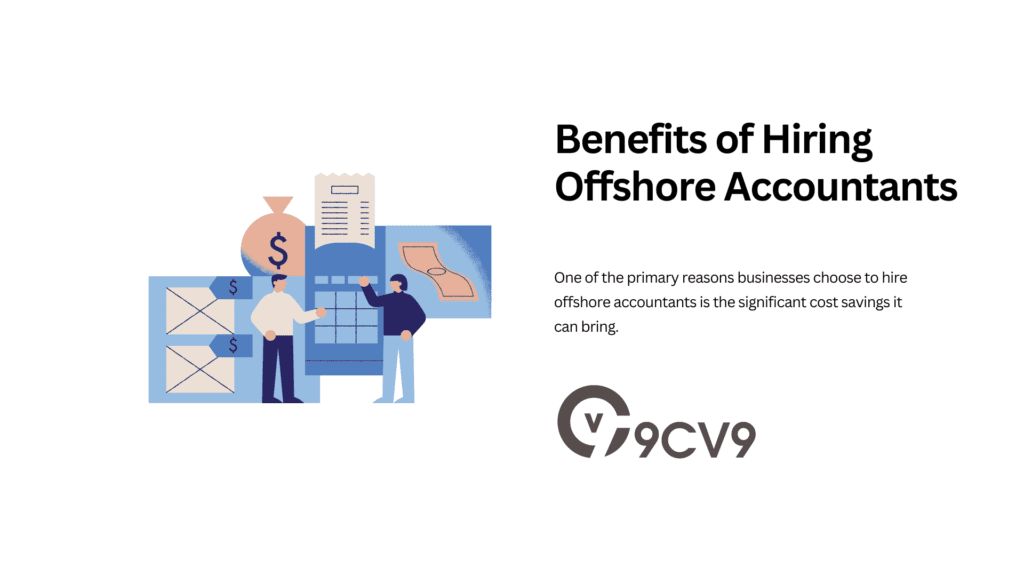
Hiring offshore accountants can offer a multitude of benefits for businesses of all sizes.
In this section, we will explore the advantages that come with offshoring your accounting functions, going beyond the obvious cost savings.
Understanding these benefits will help you make an informed decision when considering offshore accounting as a strategic solution for your financial needs.
Cost Savings and Reduced Overhead Expenses
One of the primary reasons businesses choose to hire offshore accountants is the significant cost savings it can bring.
Offshore locations often have lower labor and operating costs compared to domestic options, allowing businesses to access highly skilled accounting professionals at a fraction of the cost.
For instance, a small startup based in the United States might find it financially burdensome to hire a full-time, on-site accountant due to high salary expectations and associated expenses such as benefits, office space, and equipment.
By outsourcing accounting tasks to an offshore location like India or the Philippines, the company can access qualified professionals who offer competitive rates without compromising quality.
They might also choose to hire offshore talent in Vietnam, whereby there is an abundance of affordable and hardworking talent.
Access to Specialized Expertise and Skills
Offshore accountants often possess specialized expertise and skills that can be highly advantageous to businesses.
These professionals are well-versed in accounting principles, taxation laws, and industry-specific regulations of their respective countries, providing a valuable asset to companies seeking specific knowledge in niche areas.
For instance, if your business operates in a complex industry with unique accounting requirements, such as healthcare or real estate, finding local accountants with specialized expertise can be challenging and expensive.
Offshore accountants, on the other hand, may have extensive experience in your industry, allowing them to provide valuable insights and handle complex accounting tasks efficiently.
3. Scalability and Flexibility in Resource Allocation
Offshore accounting provides businesses with the flexibility to scale their accounting resources based on fluctuating demands.
Unlike hiring and managing in-house accountants, which can be time-consuming and costly, offshore accounting allows for easy resource allocation based on project needs or business growth.
For example, during tax season or when facing a high volume of accounting work, you can quickly scale up your offshore accounting team to accommodate the increased workload.
This scalability ensures that your accounting operations remain efficient and productive without the need for extensive recruitment and training processes.
4. Increased Efficiency and Productivity
Offshore accountants can significantly enhance the efficiency and productivity of your accounting processes.
These professionals are often trained to work with advanced accounting software and tools, enabling streamlined workflows and faster turnaround times.
By leveraging their expertise and familiarity with technology, offshore accountants can efficiently handle tasks such as bookkeeping, financial analysis, payroll processing, and financial reporting.
This increased efficiency translates to quicker decision-making, improved financial transparency, and a more agile business operation overall.
Hiring offshore accountants offers a range of benefits that extend beyond cost savings.
From accessing specialized expertise and skills to achieving scalability and increased efficiency, offshoring your accounting functions can be a strategic move to enhance your financial operations.
By understanding these advantages, you can make an informed decision and leverage the global talent pool to drive your business forward.
2. Challenges of Offshore Hiring of Accountants and How to Overcome Them
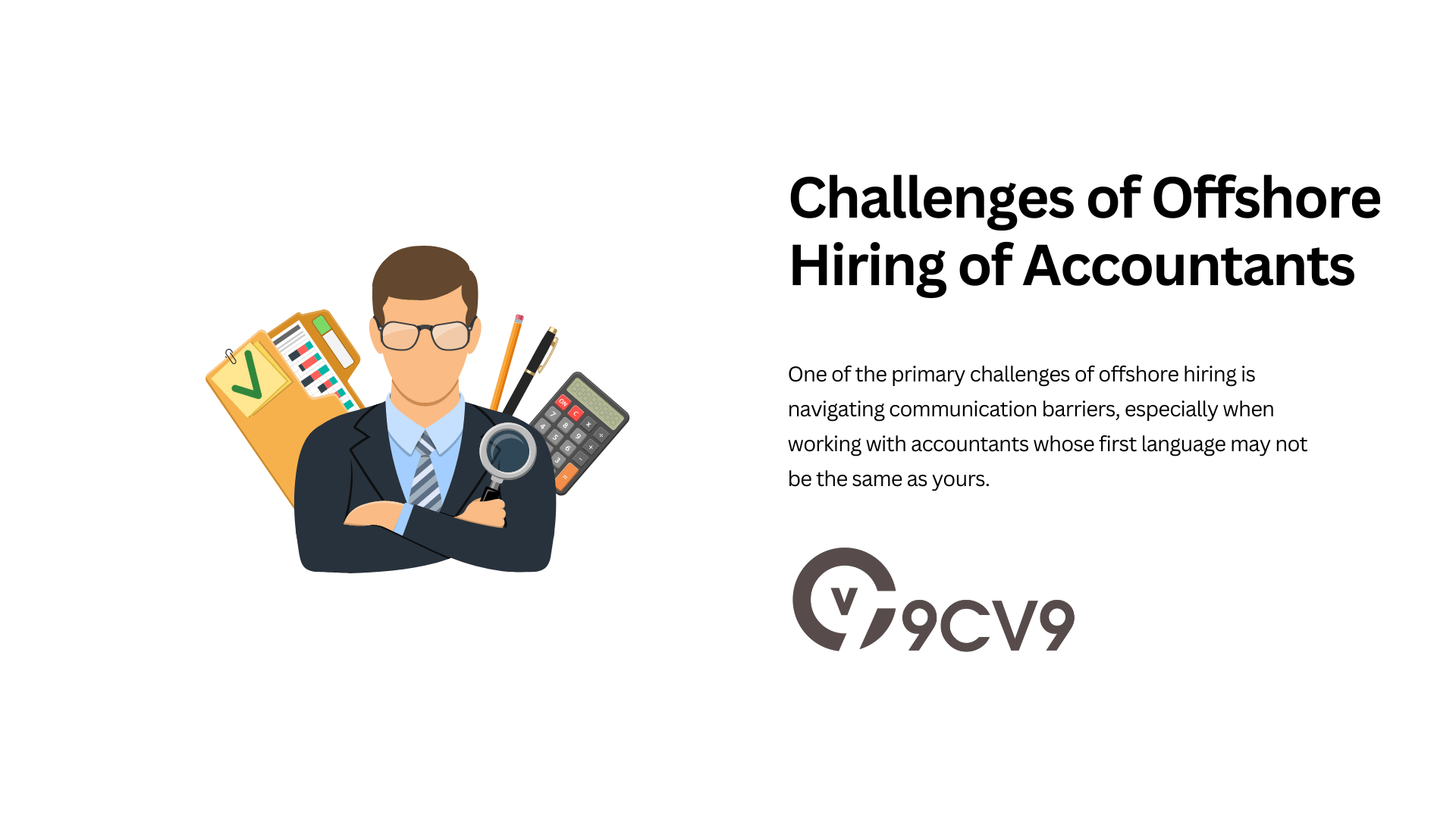
While offshore hiring of accountants offers numerous benefits, it is important to acknowledge and address the challenges that may arise when managing a remote team.
In this section, we will explore common challenges associated with the offshore hiring of accountants and provide practical solutions to overcome them.
By proactively tackling these challenges, you can ensure effective communication, collaboration, and integration of offshore accountants into your business operations.
Communication Barriers and Language Proficiency
One of the primary challenges of offshore hiring is navigating communication barriers, especially when working with accountants whose first language may not be the same as yours.
Miscommunication can lead to errors, delays, and misunderstandings that can impact the accuracy and efficiency of your accounting processes.
To overcome this challenge, it is crucial to establish clear and effective communication channels from the outset.
Here are some strategies to consider:
- Implement regular video conferences: Video conferences allow for face-to-face interaction, fostering better understanding and building rapport among team members.
- Use project management tools: Utilize project management tools such as Trello, Asana, or Basecamp to track tasks, deadlines, and progress. These tools facilitate transparency and collaboration, ensuring everyone is on the same page.
- Provide detailed instructions: Clearly articulate your expectations, deadlines, and deliverables. Break down complex tasks into smaller, manageable steps, and provide detailed instructions to minimize confusion.
Also, read our top guide on “10 Characteristics of Workplace Culture in Southeast Asia You Need to Know”.
Cultural Differences and Understanding Diverse Work Environments
Cultural differences can impact how offshore accountants perceive and approach their work.
Varied work ethics, communication styles, and decision-making processes may require careful consideration to ensure smooth collaboration and alignment with your organization’s values and goals.
To overcome cultural differences, it is essential to foster an inclusive work environment that appreciates and respects diversity.
Here are some strategies to bridge the cultural gap:
- Promote cultural awareness: Provide cultural sensitivity training to both onshore and offshore team members to enhance understanding and promote inclusivity.
- Establish clear expectations: Clearly define your organization’s expectations, work standards, and ethics to ensure alignment regardless of cultural backgrounds.
- Encourage open communication: Foster an environment where team members feel comfortable expressing their opinions and ideas. Encourage active listening and value diverse perspectives.
Time Zone Disparities and Managing Remote Teams
Time zone differences can pose challenges in coordinating schedules, especially when real-time communication is necessary.
It’s essential to find ways to overcome these disparities to ensure effective collaboration and avoid unnecessary delays.
To overcome time zone challenges, consider the following strategies:
- Overlap working hours: Identify a few hours each day where there is an overlap in working hours between the onshore and offshore teams. This overlap allows for real-time collaboration and communication.
- Utilize asynchronous communication: Leverage project management tools, email, and chat platforms to enable asynchronous communication. This way, team members can update their progress, ask questions, and share information even when they are in different time zones.
- Clearly define expectations: Clearly communicate response time expectations for emails, messages, and tasks to manage expectations and ensure timely communication.
Strategies for Effective Communication and Collaboration
Building effective communication and collaboration is vital for the success of offshore hiring.
Here are some additional strategies to foster effective communication and collaboration:
- Regular check-ins: Schedule regular check-in meetings to discuss progress, address challenges, and provide feedback. These meetings help build rapport, clarify expectations, and ensure everyone is aligned.
- Use visual aids and documentation: Utilize visual aids, such as flowcharts or process diagrams, to enhance understanding. Document important processes, guidelines, and expectations to provide clarity and reference material.
- Encourage knowledge sharing: Create opportunities for knowledge sharing and cross-training between onshore and offshore teams. This helps foster a collaborative environment and ensures a smooth transfer of expertise.
Offshore hiring of accountants comes with its fair share of challenges, but with proper strategies in place, these challenges can be overcome.
By addressing communication barriers, understanding cultural differences, managing time zone disparities, and promoting effective communication and collaboration, you can create a cohesive and productive working environment with your offshore accountants.
Embracing these strategies will enable you to leverage the benefits of offshore hiring while minimizing potential obstacles.
Also, read our most popular guide on communication: Efficient Communication For Remote Teams: Top 5 Useful and Quick Tools in 2023.
3. Finding the Right Offshore Accountants
Finding the right offshore accountants is a critical step in the process of hiring offshore talent.
The success of your offshore accounting team hinges on selecting qualified professionals who align with your business requirements and culture.
In this section, we will discuss effective strategies to find the right offshore accountants, ensuring seamless integration into your organization.
Determine Your Specific Accounting Needs
Before you begin your search for offshore accountants, it is essential to have a clear understanding of your specific accounting needs.
Consider the following factors:
- Expertise required: Identify the specific areas of expertise you require, such as bookkeeping, financial analysis, taxation, or auditing. Determine the level of proficiency needed in accounting software and industry-specific regulations.
- Workload and scalability: Assess the volume and complexity of your accounting tasks to determine the number of offshore accountants required. Consider your future growth plans and the potential scalability of your offshore accounting team.
- Communication and collaboration: Evaluate the level of communication and collaboration required with your offshore accountants. Consider language proficiency, time zone compatibility, and the need for real-time interaction.
Sourcing Channels for Offshore Accountants
To find the right offshore accountants, it is crucial to explore various sourcing channels.
Consider the following options:
- Offshore service providers: Engage reputable offshore service providers that specialize in accounting and financial services. These providers often have access to a pool of qualified accountants and can handle the recruitment and management process on your behalf.
- Online platforms and job boards: Utilize online platforms such as 9cv9 Accounting Hiring Platform, and job boards that cater specifically to offshore accounting talent. These platforms allow you to post job listings, review candidate profiles, and connect directly with potential offshore accountants.
- Referrals and recommendations: Seek referrals and recommendations from trusted sources, such as colleagues, industry associations, or professional networks. Recommendations from reliable sources can help you find offshore accountants with proven expertise and a track record of success. Using Jobsrefer, the world’s 1st decentralized recruiter platform might help accelerate this.
Evaluating Qualifications, Experience, and Cultural Fit
When evaluating offshore accountants, it is important to assess their qualifications, experience, and cultural fit with your organization.
Consider the following steps:
- Review qualifications and certifications: Request resumes or CVs from potential candidates and review their educational background, professional certifications, and relevant training.
- Assess the experience and track record: Evaluate candidates’ experience in accounting, including the industries they have worked in and the complexity of projects they have handled. Look for candidates who have a proven track record of delivering high-quality work.
- Cultural fit assessment: Assess the candidate’s cultural fit by conducting interviews that focus not only on their technical skills but also on their ability to adapt to different work cultures and collaborate effectively.
Collaboration and Onboarding Process
Once you have selected the right offshore accountants, it is crucial to establish effective collaboration and a smooth onboarding process.
Consider the following strategies:
- Establish clear communication channels: Set up communication channels such as email, instant messaging platforms, and project management tools to facilitate seamless communication between onshore and offshore teams.
- Define roles and responsibilities: Clearly communicate the roles and responsibilities of offshore accountants within your organization. Establish reporting lines, escalation procedures, and performance expectations.
- Provide training and support: Offer comprehensive training on your company’s accounting systems, processes, and tools. Provide ongoing support and resources to help offshore accountants integrate into your organization.
In conclusion, finding the right offshore accountants requires a strategic approach that aligns with your specific accounting needs and organizational culture.
By determining your requirements, exploring various sourcing channels, evaluating qualifications and experience, and establishing effective collaboration and onboarding processes, you can successfully find and integrate offshore accountants who will contribute to the growth and success of your business.
4. Managing Offshore Accountants
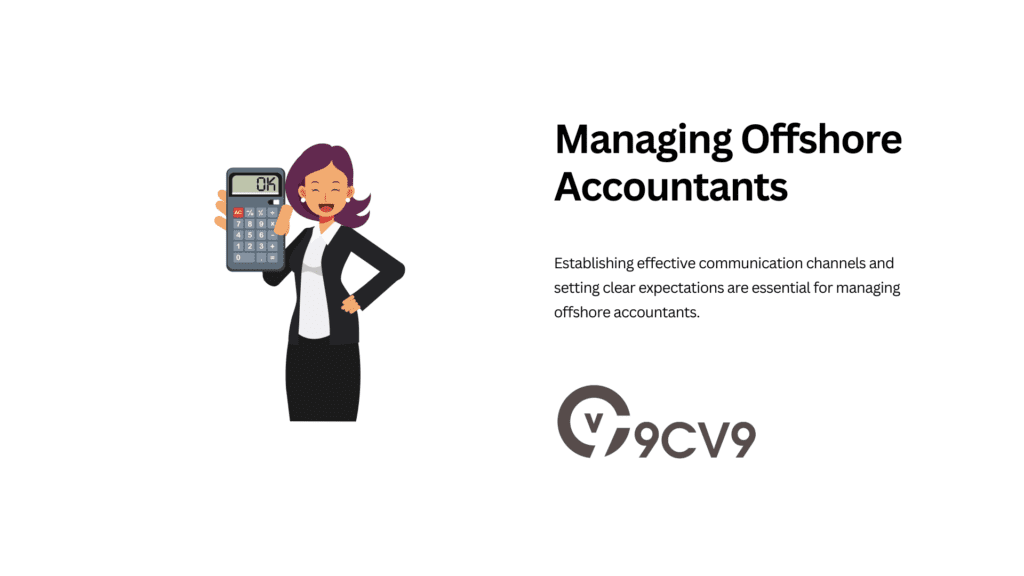
Managing offshore accountants is a crucial aspect of successful offshoring.
Effective management ensures seamless collaboration, productivity, and accountability within your offshore accounting team.
In this section, we will discuss essential strategies and best practices for managing offshore accountants, along with relevant examples to illustrate their application.
1. Clear Communication and Expectations
Clear communication is the foundation of successful management.
Establishing effective communication channels and setting clear expectations are essential for managing offshore accountants.
Consider the following strategies:
- Regular virtual meetings: Schedule regular virtual meetings to discuss ongoing projects, address challenges, and provide feedback. These meetings foster open communication and ensure alignment with your goals.
- Use collaborative tools: Utilize project management and communication tools, such as Slack or Microsoft Teams, to facilitate real-time communication, document sharing, and task tracking. This enhances transparency and efficiency.
- Clearly define roles and responsibilities: Clearly communicate the roles and responsibilities of each team member to avoid confusion and ensure accountability. Establish reporting structures and set performance expectations.
Foster a Collaborative Work Environment
Building a collaborative work environment is crucial for effective teamwork, especially when working with offshore accountants.
Consider the following strategies:
- Encourage knowledge sharing: Foster a culture of knowledge sharing and continuous learning. Encourage offshore accountants to share their expertise and insights with the rest of the team.
- Promote cross-team collaboration: Facilitate collaboration between onshore and offshore teams by assigning joint projects or organizing virtual team-building activities. This promotes teamwork and helps build strong relationships.
- Emphasize inclusivity: Promote inclusivity by actively involving offshore accountants in decision-making processes and team discussions. Encourage open communication and create a supportive work environment.
Provide Ongoing Support and Training
Ongoing support and training are essential for the professional development and success of offshore accountants.
Consider the following strategies:
- Training and onboarding: Provide comprehensive training to offshore accountants during the onboarding process. This includes familiarizing them with your company’s accounting systems, processes, and tools.
- Continuous learning opportunities: Encourage offshore accountants to enhance their skills and knowledge through online courses, webinars, or professional certifications. Provide support and resources to facilitate their professional growth.
- Regular performance evaluations: Conduct regular performance evaluations to provide feedback, recognize achievements, and identify areas for improvement. This helps offshore accountants understand their strengths and areas where they can further develop their skills.
Cultural Sensitivity and Inclusion
Cultural sensitivity and inclusion are crucial when managing offshore accountants from diverse backgrounds.
Consider the following strategies:
- Cultural awareness training: Provide cultural awareness training to promote understanding and appreciation of different cultures. This helps foster a respectful and inclusive work environment.
- Celebrate diversity: Recognize and celebrate cultural holidays and events to create a sense of belonging for offshore accountants. Encourage them to share their cultural traditions and practices with the team.
- Facilitate cross-cultural collaboration: Foster collaboration and teamwork between onshore and offshore accountants, promoting cross-cultural understanding and exchange of ideas.
Effectively managing offshore accountants requires clear communication, fostering a collaborative work environment, providing ongoing support and training, and embracing cultural sensitivity and inclusion.
By implementing these strategies, you can maximize the potential of your offshore accounting team, ensuring their integration into your organization’s operations and contributing to your overall success.
5. Ensuring Data Security and Confidentiality
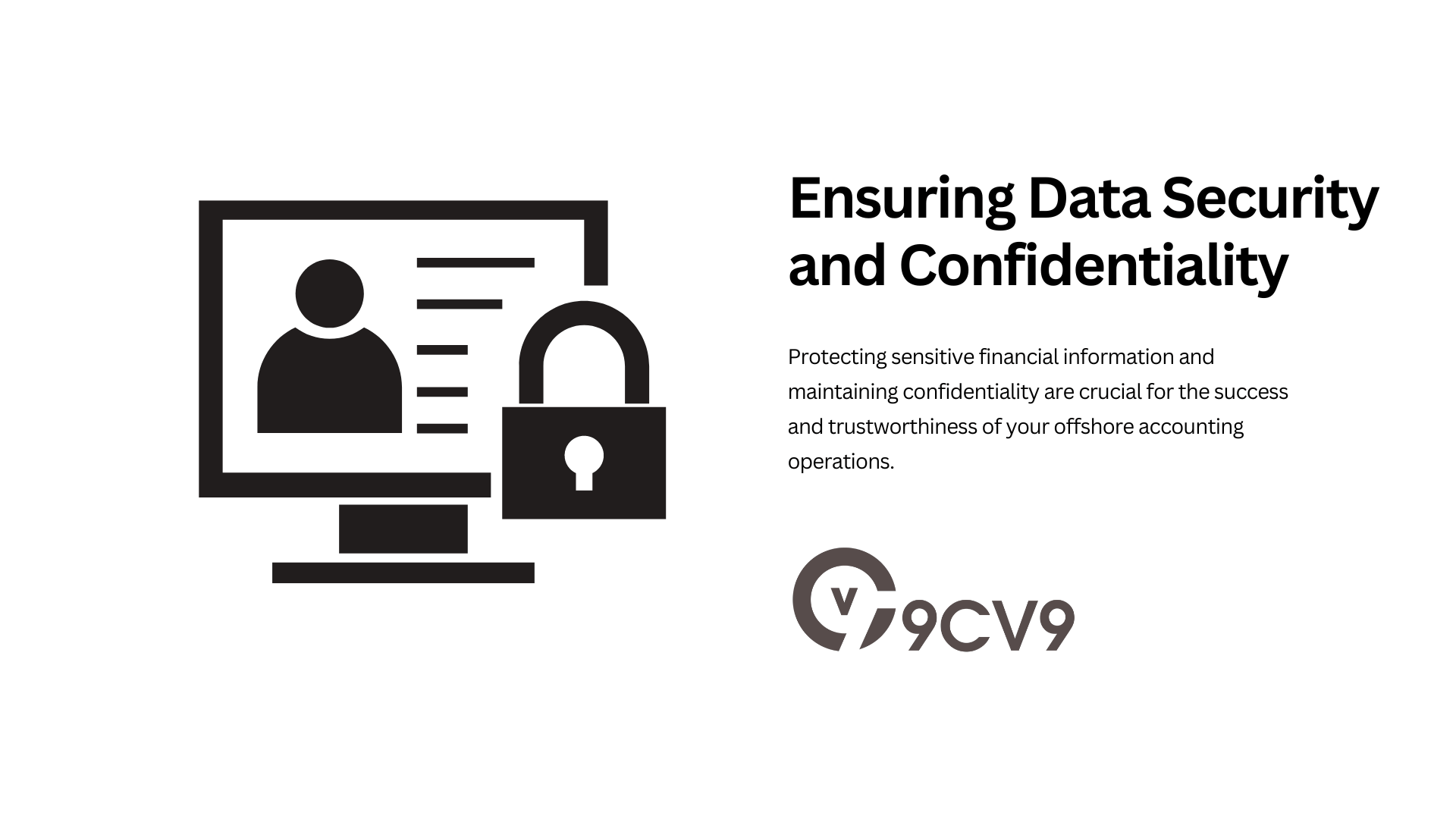
Data security and confidentiality are paramount when hiring offshore accountants.
Protecting sensitive financial information and maintaining confidentiality are crucial for the success and trustworthiness of your offshore accounting operations.
In this section, we will explore essential strategies and best practices for ensuring data security and confidentiality when working with offshore accountants.
1. Implement Robust Data Security Measures
Implementing robust data security measures is fundamental to safeguarding sensitive financial information.
Consider the following strategies:
- Data encryption: Use encryption techniques to protect data both in transit and at rest. This ensures that even if intercepted, the data remains unreadable and secure.
- Secure access controls: Implement strong access controls, such as multi-factor authentication and role-based access, to restrict unauthorized access to sensitive data.
- Regular software updates and patches: Keep all software and systems up to date with the latest security patches to protect against known vulnerabilities.
Also, hire a top-class cybersecurity specialist using our job description templates.
2. Use Secure File Transfer and Collaboration Tools
Utilizing secure file transfer and collaboration tools is crucial for protecting sensitive financial information during communication and collaboration. Consider the following strategies:
- Virtual private networks (VPNs): Use VPNs to establish secure connections and encrypt data during file transfers and remote access to internal systems.
- Secure file-sharing platforms: Employ secure file-sharing platforms that offer encryption, access controls, and audit logs to track file activities and maintain data integrity.
- Collaboration tools with built-in security: Choose collaboration tools that prioritize data security, providing end-to-end encryption and secure communication channels for discussions and file sharing.
3. Conduct Regular Security Audits and Assessments
Regular security audits and assessments are vital to identify and address potential vulnerabilities in your data security infrastructure. Consider the following strategies:
- External security audits: Engage third-party security experts to conduct external audits and assessments of your data security practices, infrastructure, and systems.
- Internal security assessments: Perform internal assessments to evaluate compliance with data security policies, identify potential risks, and implement necessary security measures.
- c. Penetration testing: Conduct regular penetration testing to identify any weaknesses or vulnerabilities in your systems and address them promptly.
4. Establish Clear Data Handling Policies
Establishing clear data handling policies and procedures is crucial for ensuring data security and confidentiality. Consider the following strategies:
- Data classification and access levels: Classify data based on its sensitivity and establish access levels accordingly. Only grant access to confidential financial information to authorized individuals who require it for their job responsibilities.
- Confidentiality agreements: Require all offshore accountants to sign confidentiality agreements that clearly outline their responsibilities and obligations regarding the handling of sensitive financial data.
- Regular training on data security: Provide regular training to your offshore accountants on data security best practices, emphasizing the importance of maintaining confidentiality and adhering to data handling policies.
In conclusion, ensuring data security and confidentiality when working with offshore accountants is of utmost importance.
By implementing robust data security measures, using secure file transfer and collaboration tools, conducting regular security audits and assessments, and establishing clear data handling policies, you can safeguard sensitive financial information and maintain the trust and confidence of your stakeholders.
6. Evaluating Performance and Building a Long-Term Relationship
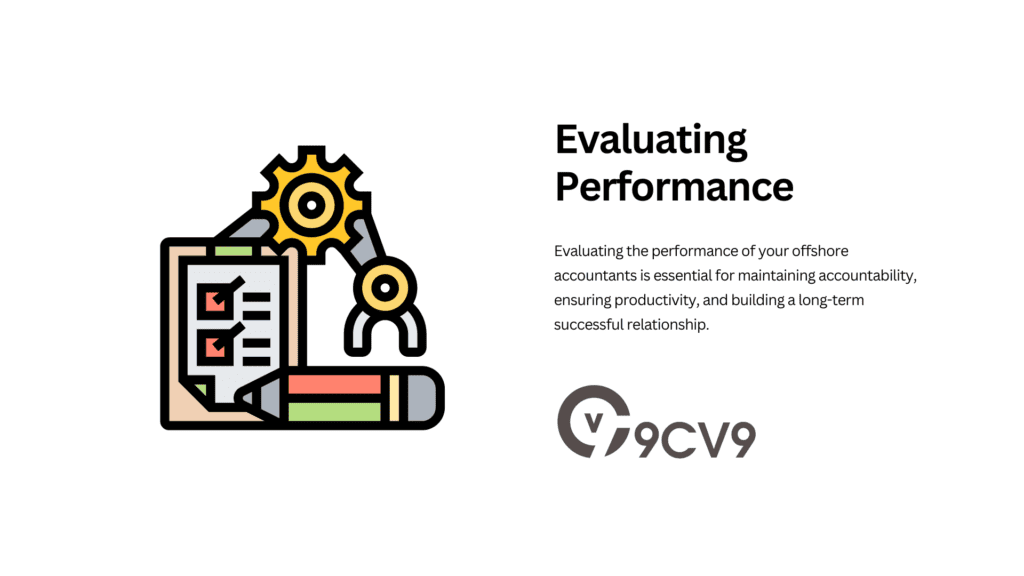
Evaluating the performance of your offshore accountants is essential for maintaining accountability, ensuring productivity, and building a long-term successful relationship.
In this section, we will explore strategies and best practices for evaluating the performance of offshore accountants and fostering a strong and enduring partnership. Relevant examples will be provided to illustrate their application.
Establish Key Performance Indicators (KPIs)
Establishing clear and measurable Key Performance Indicators (KPIs) is vital for evaluating the performance of offshore accountants.
Consider the following strategies:
- Define performance metrics: Determine the specific metrics that align with your accounting objectives and expectations. Examples may include accuracy of financial reports, meeting deadlines, or responsiveness to inquiries.
- Set realistic targets: Set realistic targets for each performance metric, taking into account the complexity of the tasks and the capabilities of the offshore accountants.
- Regularly review and assess: Regularly review the performance of offshore accountants against the established KPIs. Assess their progress, identify areas for improvement, and provide constructive feedback.
Effective Communication and Feedback
Maintaining open and effective communication channels is crucial for evaluating performance and providing feedback.
Consider the following strategies:
- Regular performance discussions: Schedule regular performance discussions with offshore accountants to review their progress, address any challenges, and provide feedback on their performance.
- Constructive feedback: Offer constructive feedback to offshore accountants, highlighting areas of improvement and recognizing their strengths. Provide specific examples and actionable suggestions to support their professional development.
- Two-way communication: Encourage offshore accountants to share their perspectives, ideas, and concerns. Engage in two-way communication to foster a collaborative and supportive environment.
Performance Incentives and Recognition
Recognizing and incentivizing high-performance offshore accountants can contribute to building a long-term relationship and motivation.
Consider the following strategies:
- Performance-based incentives: Implement performance-based incentives such as bonuses or additional benefits to motivate offshore accountants and reward exceptional performance.
- Employee recognition programs: Establish employee recognition programs to acknowledge the efforts and achievements of offshore accountants. This can include certificates of excellence, employee spotlights, or public recognition within the organization.
- Career development opportunities: Provide career development opportunities for offshore accountants, such as training programs or opportunities for advancement. This demonstrates a long-term commitment to their professional growth.
Foster a Long-Term Partnership
Building a long-term partnership with offshore accountants requires fostering trust, engagement, and a sense of belonging.
Consider the following strategies:
- Regular engagement activities: Organize virtual team-building activities, webinars, or social events to foster a sense of camaraderie and team spirit among onshore and offshore accountants.
- Knowledge sharing and professional development: Encourage knowledge sharing and provide opportunities for professional development. This helps offshore accountants feel valued and invested in the partnership.
- Continuous improvement and growth: Continuously seek feedback from offshore accountants on process improvements and implement their suggestions when feasible. This demonstrates a commitment to their growth and enhances the partnership.
Evaluating the performance of offshore accountants and building a long-term relationship requires establishing clear KPIs, effective communication and feedback, performance incentives and recognition, and fostering a sense of partnership.
By implementing these strategies, you can evaluate performance effectively, motivate offshore accountants, and build a strong and enduring relationship based on trust, engagement, and mutual growth.
Conclusion
In today’s globalized business landscape, hiring offshore accountants has become an increasingly popular and viable option for organizations seeking cost-effective and skilled accounting services.
This comprehensive guide has provided you with valuable insights and strategies for successfully hiring offshore accountants.
By following the step-by-step process outlined in this guide, you can navigate the complexities of offshore hiring and build a reliable and efficient offshore accounting team.
Let’s recap the key takeaways:
- Understanding the Benefits: Offshore hiring of accountants offers numerous advantages, including cost savings, access to a diverse talent pool, increased productivity, and scalability.
- Navigating the Challenges: While there are challenges associated with offshore hiring, such as language barriers, cultural differences, and time zone variations, they can be overcome through effective communication, cultural sensitivity, and proactive management.
- Finding the Right Offshore Accountants: Utilize various sourcing strategies, including referrals, online platforms, and professional networks, to find the right offshore accountants. Conduct thorough interviews, assess their skills and qualifications, and consider their cultural fit to make an informed hiring decision.
- Managing Offshore Accountants: Establish clear communication channels, foster a collaborative work environment, provide ongoing support and training, and embrace cultural sensitivity to effectively manage your offshore accountants. Examples include regular virtual meetings, knowledge-sharing sessions, and inclusive decision-making processes.
- Ensuring Data Security and Confidentiality: Implement robust data security measures, use secure file transfer and collaboration tools, conduct regular security audits, and establish clear data handling policies to protect sensitive financial information. Examples include data encryption, secure file-sharing platforms, and regular security assessments.
- Evaluating Performance and Building a Long-Term Relationship: Establish key performance indicators (KPIs), maintain effective communication and feedback channels, recognize high performance through incentives and employee recognition programs, and foster a long-term partnership by engaging in regular engagement activities and providing growth opportunities.
By incorporating these strategies into your offshore hiring process, you can successfully navigate the complexities and reap the benefits of hiring offshore accountants.
Remember, the key to a successful offshore accounting team lies in clear communication, cultural understanding, continuous improvement, and building trust-based relationships.
As you embark on your journey to hire offshore accountants, keep in mind that each organization’s needs and circumstances are unique.
It is crucial to adapt the strategies outlined in this guide to fit your specific requirements and goals.
Regularly evaluate your offshore accounting operations, seek feedback from your offshore accountants, and make necessary adjustments to ensure optimal performance and long-term success.
With careful planning, effective management, and a commitment to collaboration, hiring offshore accountants can revolutionize your accounting processes and contribute to the growth and success of your organization.
Embrace the opportunities offered by offshore hiring, and embark on a transformative journey towards a more efficient and cost-effective accounting operation.
If your company needs HR, hiring, or corporate services, you can use 9cv9 hiring and recruitment services. Book a consultation slot here, or send over an email to [email protected].
If you find this article useful, why not share it with your hiring manager and C-level suite friends and also leave a nice comment below?
We, at the 9cv9 Research Team, strive to bring the latest and most meaningful data, guides, and statistics to your doorstep.
To get access to top-quality guides, click over to 9cv9 Blog.
People Also Ask
What is an offshore bookkeeper?
An offshore bookkeeper is a professional who handles financial record-keeping, such as recording transactions, managing accounts payable and receivable, reconciling bank statements, and generating financial reports, but operates remotely from a different country than where the business is located, often to leverage cost savings and access a broader talent pool.
What is offshoring accounting?
Offshoring accounting refers to the practice of outsourcing accounting functions to a third-party service provider located in a different country. It involves transferring accounting processes, such as bookkeeping, payroll, tax preparation, and financial analysis, to leverage cost advantages, access skilled talent, and streamline operations.
What are the pros and cons of offshore accounting?
Pros of offshore accounting include cost savings, access to a skilled global talent pool, increased scalability, and potential for improved efficiency. However, cons include language and cultural barriers, potential data security risks, time zone differences, and challenges in communication and coordination.































![Writing A Good CV [6 Tips To Improve Your CV] 6 Tips To Improve Your CV](https://blog.9cv9.com/wp-content/uploads/2020/06/2020-06-02-2-100x70.png)


